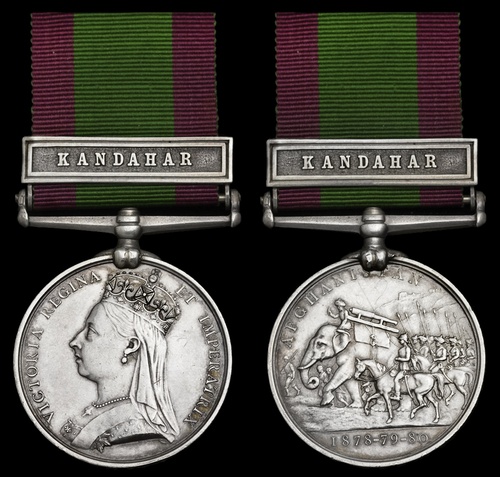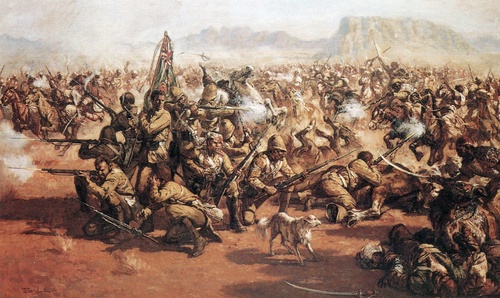Auction: 25001 - Orders, Decorations and Medals
Lot: 29
(x) A tragic Battle of Maiwand casualty's Afghanistan Medal awarded to Private W. Davis, 66th Regiment of Foot
Afghanistan 1878-80, 1 clasp, Kandahar (B/375. Pte. W. Davis. 66th Foot.), minor official correction to the surname, likely from 'Davies', pawnbroker's mark to the reverse, good very fine
Note the medal appears entirely as issued with no signs of the suspension being replaced, it is believed that the Kandahar clasp was fitted in error.
William Davis was serving with the 66th Foot in 1880 when they joined General Primrose's Kandahar Field Force. They were still there when news came from Herat that Ayub Khan had declared himself Emir of Afghanistan and was marching on the Kandahar at the head of an army of regular Afghan troops with good artillery support.
The British response was to send a Brigade made up of largely Indian troops built around a core of the 66th Foot (less two companies) and E/B Battery, Royal Horse Artillery. The Regiment marched on Girishk where they were to meet the troops of Shere Ali, the Wali of Kandahar, however those troops mutinied and the 66th were ordered to pursue the mutineers.
Taking the guns which the Wali's troops had brought they continued their march towards Maiwand with elements of the 66th forming the crews for the new cannon. In the event Ayub Khan beat them to the village of Maiwand itself but the British were able to bring him to Battle near the villages of Khig and Mundabad. The Army opposing them was far larger than expected as many warriors from the surrounding countryside had risen in support of the prospective Emir.
General Burrows deployed his men before a narrow ravine however the guns advanced further than intended and he was forced to send his infantry over the feature in support. There followed an unequal artillery duel as the British guns attempted to suppress the superior number of Afghan cannon. They were not successful and soon found themselves running low on ammunition.
Even as this continued the Afghan irregulars had discovered a number of ravines and dried riverbeds which allowed them to infiltrate to within jezail shot of the British. A steady trickle of casualties began to be incurred from sniping, particularly the officers which in the newly raised 30th Bombay Native Infantry (Jacob's Rifles) caused consternation. Even as this happened Afghan cavalry began to probe the edge and rear of the British line, adding to the sense of being overwhelmed.
Eventually the British-manned smoothbore guns ran out of ammunition and retired to the rear however, with most of their officers casualties, the sight of this apparent retreat caused several companies of Jacob's Rifles to break. They had been moved to support the British left and so their precipitous withdrawal caused them to run through the ranks of the rest of the army and the guns of E/B Battery, disordering them both. At this the Afghan infantry pressed in and a general retreat began amongst all but the 66th who held their ground in the face of an increasingly frenzied attack.
While the bulk of the British forces withdrew across the ravine the 66th were pushed south into the village of Khig where they made a number of small stands in the walled gardens on the far side from the battleground. Colonel Galbraith was killed rallying his men near the village and soon all who were able to cut themselves free while around 100 men held out in the gardens.
These were whittled down until low on ammunition and, totally surrounded, there were only twelve still alive. One of Ayub Khan's senior artillery officers describes their last moments:
'These men charged out of the garden, and died with their faces to the foe, fighting to the death. Such was the nature of the charge, and the grandeur of their bearing, that although the whole of the ghazis were assembled around them, no one dared to approach to cut them down. Thus, standing in the open, firing steadily and truly, every shot telling, surrounded by thousands, these officers and men died; and it was not until the last man was shot down that the ghazis dared advance upon them. The conduct of those men was the admiration of all that witnessed it.'
From a force of 20 officers and 501 other ranks the Battalion suffered losses of 9 officers and 275 other ranks killed. Around three quarters of their losses occurred when the line broke and they withdrew to Khig to make their last stands. Davis was amongst the dead, he was not one of the 27 N.C.O.s and other ranks who were identified so it is not known where he fell but it was most likely around the village where the bulk of the Regiment were cut down. He is commemorated on the Maiwand Memorial at Reading and appears on the roll as William Davis, a unique name (notably there are no William Davies on the roll).
Subject to 5% tax on Hammer Price in addition to 20% VAT on Buyer’s Premium.
Estimate
£1,400 to £1,800
Starting price
£1100







